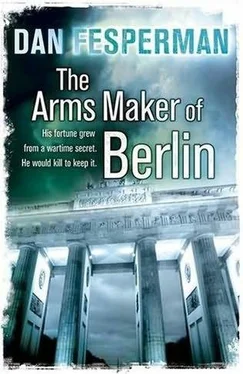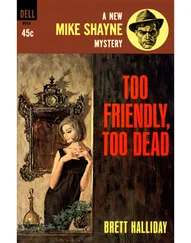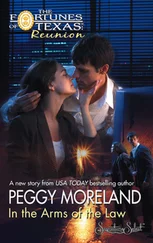Dan Fesperman - The Arms Maker of Berlin
Здесь есть возможность читать онлайн «Dan Fesperman - The Arms Maker of Berlin» весь текст электронной книги совершенно бесплатно (целиком полную версию без сокращений). В некоторых случаях можно слушать аудио, скачать через торрент в формате fb2 и присутствует краткое содержание. Жанр: Триллер, на английском языке. Описание произведения, (предисловие) а так же отзывы посетителей доступны на портале библиотеки ЛибКат.
- Название:The Arms Maker of Berlin
- Автор:
- Жанр:
- Год:неизвестен
- ISBN:нет данных
- Рейтинг книги:5 / 5. Голосов: 1
-
Избранное:Добавить в избранное
- Отзывы:
-
Ваша оценка:
- 100
- 1
- 2
- 3
- 4
- 5
The Arms Maker of Berlin: краткое содержание, описание и аннотация
Предлагаем к чтению аннотацию, описание, краткое содержание или предисловие (зависит от того, что написал сам автор книги «The Arms Maker of Berlin»). Если вы не нашли необходимую информацию о книге — напишите в комментариях, мы постараемся отыскать её.
The Arms Maker of Berlin — читать онлайн бесплатно полную книгу (весь текст) целиком
Ниже представлен текст книги, разбитый по страницам. Система сохранения места последней прочитанной страницы, позволяет с удобством читать онлайн бесплатно книгу «The Arms Maker of Berlin», без необходимости каждый раз заново искать на чём Вы остановились. Поставьте закладку, и сможете в любой момент перейти на страницу, на которой закончили чтение.
Интервал:
Закладка:
Dan Fesperman
The Arms Maker of Berlin
For all those people
who dig up the secrets
My most beautiful poem?
I didn’t write it.
From the deepest depths it rose.
I kept it silent.
Mein schönstes Gedicht?
Ich schrieb es nicht.
Aus tiefsten Tiefen stieg es.
Ich schwieg es.
— from the poem “Schweigen” (“Silence”),
by Mascha Kaléko
ONE
The biggest hazard of studying history,” Nat Turnbull once told his wife, “is that if you spend too much time looking backward, you’ll be facing the wrong way when the forces of the here and now roll forward to crush you.”
As if to prove the point, his wife filed for divorce the following week, catching Nat completely by surprise.
Five years later he was again facing the wrong way, so to speak, when a pair of phone calls summoned him urgently back to the dangers of the present. He was three stories underground at the time, asleep at his desk in the stacks of the university library. An unlikely location, perhaps, for the beginning of an adventure in which lives would be lost, but Nat was trained to appreciate that sort of irony.
The first call arrived just as a dark dream of another era goose-stepped across his brain. His cell phone jolted him awake, squirming in his pocket like a frog. Opening his eyes to utter darkness, Nat realized he must have slept past closing hour. It wasn’t the first time. He kept a flashlight for these emergencies, but it seemed to have disappeared. No use groping for the lamp, either. Security would have cut the power by now. Library budgets weren’t what they used to be at Wightman University.
The phone twitched again as he fumbled in his pocket. He was addled, groggy, a miner regaining consciousness after a cave-in. What time was it? What day? What century? Mandatory question in his line of work. Nat was a history professor. Specialty: Modern Germany. At Wightman that covered everything from the Weimar Republic of 1919 onward, and while Nat was in love with the sweep and grandeur of the whole era, neither friend nor foe was under any illusion as to his true calling. He remained as thoroughly haunted by the long shadow of the Third Reich as those Hitler-centric folks on the History Channel. In Nat’s treasure hunts, X never marked the spot. A swastika did, or some pile of old bones. Dig at risk of contamination.
He snicked open the phone, and the blue glow offered a beacon of hope until he saw the incoming number. Gordon Wolfe, his onetime master and commander, calling at 1:04 a.m., meant Nat was about to be subjected to an angry tirade or a teary confessional, and either would likely be served in a marinade of French cognac and Kentucky bourbon. He answered with a vague sense of stage fright.
“Gordon?”
“No, it’s Viv. Gordon’s in jail. You have to get up here.”
“Jail? What’s happened?”
“They took him away. Him and some archives. They took everything.”
“Gordon’s archives? All of them? Where are you, Viv?”
“Blue Kettle Lake. Our summer place.”
The Adirondacks. Of course. That was where the old Minotaur always retreated when the going got tough, and lately the going had been unbearable.
“The police handcuffed him the moment we walked in the door. You’d have thought he was John Dillinger. They’re saying he stole it, that he stole everything, which is nuts.”
“Stole what, Viv? Slow down. Start at the beginning.”
By now the phone light had switched off. Nat, sole survivor of the European Research Collection, again sat in the darkness of carrel C-19 in the basement stacks of Hartsell Library. He had often boasted he could find his way out of here blindfolded. Tonight he might have to put up or shut up.
His nose could have told him the approximate location-musty leather bindings, chilled concrete, the chemical reek of spooled microfilm-a bouquet that probably explained why he had just been dreaming of a similar place across the Atlantic. Except there all the writing was in German and the records were haunted by so much industrialized horror that you never got comfy enough to nod off.
In his dream he had been visiting the place during wartime, a quarter century before he was born. He was descending a narrow stairway as bombs crashed overhead, and he was vaguely excited, as if on the verge of a huge discovery. Yet at each passing level the light dimmed, his dread deepened, and a grim realization took hold: The closer he got to his goal, the greater the risk that he would lose his way or be buried in rubble, forever irretrievable by family and friends.
Guilt having its say, no doubt. Work had consumed the better part of Nat’s last two decades, dating back to his undergraduate years, when a dynamic professor named Gordon Wolfe had infected him with a virulent strain of historical curiosity. The affliction had now outlasted the aforementioned marriage, a procession of careless affairs, and the upbringing of a daughter who had just finished her sophomore year at Wightman. This being a party-hearty Thursday following final exams, Karen was probably seated at this very moment with her friends around a noisy table, polishing off a celebratory pitcher of beer.
Nat had canceled a dinner date to come to the library. It seemed necessary at the time. But so far the only fruits of his labor were an unscheduled nap, and now he had learned that Gordon Wolfe was in jail in upstate New York, where the old man apparently would remain until Nat could talk Gordon’s wife, Vivian, down from the high ledge of hysteria. Judging from her voice, she had been perched there quite a while.
“It was some old files,” Viv said. “Gordon says they were planted. That’s all I could get out of him before they took him away. They bumped his head on the goddamn patrol car. We didn’t even have time to take off our coats. When we turned on the light there was a pile of boxes sitting there, right on the kitchen table. Then a bunch of FBI guys came in from the living room.”
“The FBI? Good Lord. What kind of files?”
“I don’t know. Something from the war. Gordon can tell you. I got the idea he’d seen them before, just never at our house.”
“Two boxes? Ten?”
“Four. They moved everything to the sunroom before I got a good look, and now I can’t even get in there. I’m a prisoner in my own house.”
“You see any labels? Any markings?”
“A few stickers. Ask Gordon. But first we’ve got to get him out. They haven’t set bail, but I can take care of that. I want you here for the arraignment. We can ride over together, tell the judge it’s all a lie.”
Unless it wasn’t. Frame-up or not, what in the hell was Gordon Wolfe doing at the age of eighty-four with a missing archive at his summer home in the hills? Especially if it was the archive, the one Gordon had forever mooned about to both students and colleagues in his less-guarded and more-imbibed moments. More than sixty years ago he had been one of the few wartime caretakers of that trove. Then, after the war ended, four boxes full of information had slipped through everyone’s fingers, disappearing somewhere between the Alps of Switzerland and the towers of midtown Manhattan.
Gordon had been looking for this lost treasure ever since, and during particularly acute outbreaks of gold fever he sounded like an old prospector around a campfire. He had even brought up the subject at his long-overdue retirement party, a melancholy event six years ago when everyone but Gordon had been at a loss for words, stifled by the awkward knowledge that Wightman was nudging him not so gently into the box marked “Emeritus.” What was it Gordon had said that day as he blustered on? Some bold proclamation while he waved his drink, his blocky head thrust forward like that of a reckless boxer, punch-drunk and asking for more. Now Nat remembered:
Читать дальшеИнтервал:
Закладка:
Похожие книги на «The Arms Maker of Berlin»
Представляем Вашему вниманию похожие книги на «The Arms Maker of Berlin» списком для выбора. Мы отобрали схожую по названию и смыслу литературу в надежде предоставить читателям больше вариантов отыскать новые, интересные, ещё непрочитанные произведения.
Обсуждение, отзывы о книге «The Arms Maker of Berlin» и просто собственные мнения читателей. Оставьте ваши комментарии, напишите, что Вы думаете о произведении, его смысле или главных героях. Укажите что конкретно понравилось, а что нет, и почему Вы так считаете.












